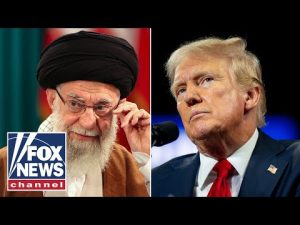In recent news, there’s a heated debate regarding Candace Owens and her alleged shift away from President Trump, sparking questions about loyalty and policy. The discussion centers around major universities like Harvard, accused of fostering an unsafe campus environment through unchecked protests, some of which have turned hostile, particularly with anti-Semitic undertones linked to the ongoing Israel-Palestine conflict. The larger question is whether these institutions should face financial repercussions from the federal government for failing to protect students’ safety, especially when they continue to receive significant federal funding.
The issue here is not just about whether Candace Owens supports the Trump administration but about the broader implications of university campuses accepting federal funds without adhering to certain standards. If universities like Harvard are failing to ensure the safety and freedom of speech for all students by allowing protests to escalate into violence, one might reasonably question why taxpayer dollars are allocated to such institutions. Federal funding comes with guidelines that require compliance; if a university is benefiting from these funds, it should not have the liberty to disregard the safety of its student body.
The presence of federal funding introduces a layer of accountability. Critics argue that if universities desire autonomy in handling campus protests and policies, they should operate without relying on federal money, which naturally comes with expectations and regulations. The analogy to public assistance is apt here: when individuals receive government aid, there are limitations and conditions. Harvard’s sizable endowment and high tuition fees further compound the argument that perhaps they do not need to rely on federal contributions, especially if they resist aligning with governmental expectations.
A crucial aspect of this situation involves the nuances of free speech. While universities serve as havens for discourse and activism, this must be balanced with ensuring that student safety is not compromised. There’s a distinction between peaceful protests and those that incite violence or discrimination. The Trump administration’s stance, demanding reform to discourage acts of anti-Semitism and ensure unbiased treatment, emphasizes this need for balance. Universities should not be venues where students’ rights are threatened under the guise of activism.
Moreover, the contention with Candace Owens’ stance points to a broader discourse about whether criticism of specific policies is veiled in broader accusations against cultural or ethnic groups. This kind of rhetoric can lead to the distracting notion that support for security measures or funding conditions is tethered to certain geographies like Israel, rather than focusing on the universal importance of student protection and institutional accountability.
In summary, while Candace Owens’ position may prompt some controversy, the greater issue highlighted involves the accountability of academic institutions accepting federal support. If universities desire the financial support of the federal government, they should adhere to the expectations that accompany it, particularly in maintaining a safe and respectful academic environment. The age-old principle of personal responsibility is applicable here: accepting funding involves conforming to the standards that protect all students, ensuring their academic and personal freedoms remain uncompromised.







